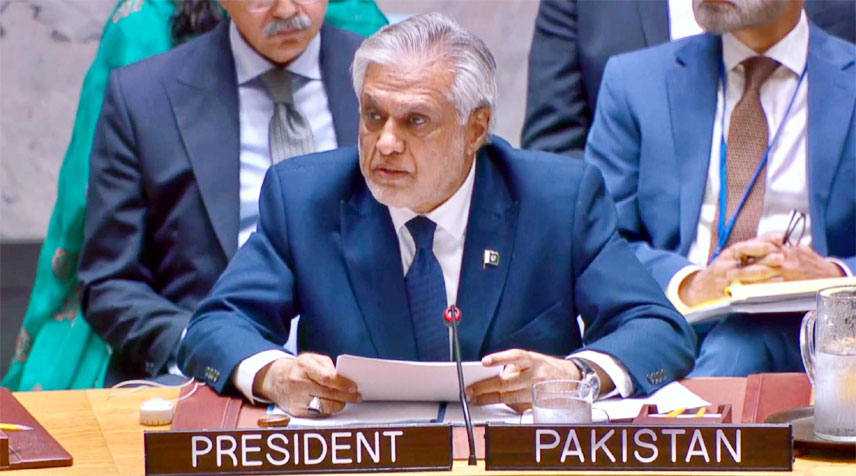NEW YORK: At a pivotal United Nations Security Council briefing, Pakistan’s Deputy Prime Minister and Foreign Minister, Senator Mohammad Ishaq Dar, called for a deeper and more institutionalized partnership between the United Nations and the Organization of Islamic Cooperation (OIC).
Presiding over the session, Dar emphasized that global instability, escalating conflicts, and the normalization of hatred demand urgent and collective action. “In this fractured world, the OIC remains a critical political force,” he said, urging the UN to strengthen its alliance with the Islamic bloc.
Dar acknowledged the presence of OIC Assistant Secretary General Yousef Al-Dobeay and UN Assistant Secretary General Khalid Khiari, thanking both for their insightful briefings.
UN and OIC Must Evolve From Dialogue to Operational Synergy
Dar stressed that Chapter VIII of the UN Charter clearly supports cooperation with regional organizations like the OIC. He noted that the OIC, as the second-largest intergovernmental body after the UN, consistently bridges global and regional peace efforts.
He underscored the OIC’s unique legitimacy, grounded in its broad membership and principled mission — defending justice, sovereignty, and the dignity of all people. He praised its active roles in conflicts from Palestine and Kashmir to Libya, Yemen, and the Sahel.
“Pakistan values this relationship deeply,” Dar stated, adding that OIC–UN engagement must evolve into tangible cooperation — including trust-based mediation, early warning systems, and coordinated field actions.
OIC’s Swift Response Capabilities Key to Global Stability
Highlighting UN General Assembly Resolution 79/9, adopted during its 79th session, Dar noted its strong reaffirmation of the UN–OIC partnership. He pointed to the OIC’s cultural sensitivity and regional reach, calling it a “credible first responder” in areas where the UN faces limitations.
The expanding partnership, he said, includes coordinated action in humanitarian crises, disarmament advocacy, and cultural heritage protection. Dar called this a “proactive, multidimensional alliance” with untapped potential for broader institutionalization.
Pakistan Calls for Global Unity Against Islamophobia
Turning to the rise of Islamophobia, Dar warned that religious hatred violates the UN Charter’s very foundation. He praised the international community for adopting Pakistan’s resolution to designate March 15 as the International Day to Combat Islamophobia and for supporting the creation of a UN Special Envoy on the issue.
Dar urged the global community to embed the OIC’s leadership role in combating religious intolerance and promoting interfaith harmony. “This is not just a moral issue — it’s a peace and security issue,” he said.
Security Council Reform and OIC Representation
Dar also addressed long-standing concerns regarding UN Security Council reform. He reiterated that OIC member states, representing over 1.9 billion people, must be adequately represented in any restructured Council.
As the largest cross-regional organization, the OIC must have a meaningful voice in shaping global governance, Dar emphasized.
Presidential Statement Expected to Cement UN–OIC Cooperation
Concluding his remarks, Dar expressed hope that the meeting would serve as a catalyst for “fresh thinking, renewed commitment, and bold action.” He stressed that genuine cooperation must go beyond geopolitics and reflect shared principles and responsibilities.
He thanked participating delegations for their constructive engagement in finalizing a Presidential Statement expected to be adopted during the session — a move seen as a key milestone in formalizing and strengthening UN–OIC collaboration.
“This partnership is not optional,” Dar concluded. “It is essential for building lasting peace and a more inclusive international order.”


Comments are closed.